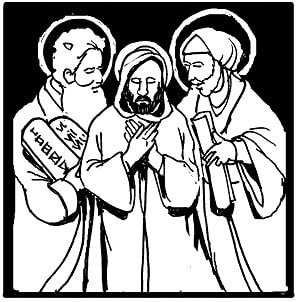
“Jesus came and touched them, saying, ‘Rise, and do not be afraid’” (Matt 17:7).
Second Sunday of Lent
Gn 12:1-4a; Ps 33: 2 Tm 1:8b-10; Mt 17:1-9
The Transfiguration, described in all four gospels, was for the early church the linchpin revelation of who Jesus is and why his paradoxical death on the cross was his glory.
This moment of intense revelation continues Jesus’ baptism. He had emerged from the waters of the Jordan, hearing a voice affirm him as God’s “Beloved Son.” His long retreat in the Judean wilderness had confirmed his mission to be not a majestic messiah but Isaiah’s Suffering Servant, who would announce God’s kingdom with forgiveness and love. All of this is shown on the mountain of the Transfiguration.
Matthew shares Mark’s theme of the “Messianic Secret,” the way the early church explained how Jesus, who was rejected and crucified, was in fact God’s message to the world. Despite sin, misunderstanding, fear and indifference, divine Mercy will redeem the universe, transform humanity and share God’s own inner life with us.
It is an astounding assertion, and the first preachers must have faced incredulity. How can a crucified Jew be said to have saved the world?
At his Transfiguration, Jesus is shown in glory. History is made transparent to the promise that the Law and Prophets both knew, that it was God’s redemptive plan for the messiah to suffer in order to enter his glory” (Luke 24;25-27).
What the world saw on Calvary was only a convicted man hanging on a cross between two thieves against a darkened horizon of abject failure. The hidden reality known to faith was God’s beloved Son standing between Moses and Elijah in a bright cloud of glory.
Peter, James and John, representing the disciples and the early church, barely grasped the mystery of Jesus’ victory through defeat. Only after the events of Good Friday and Easter Sunday do they begin to understand what Jesus had told them at Caesarea Philippi. He will need to suffer and die to fulfill his mission.
We now are blessed to see and believe what they experienced during the Transfiguration. But we are also like them, only human and slow to understand. We would rather stay on the holy mountain, basking in the light of glory. But after the vision fades, the cold wind rises again, and Jesus is nudging us to get up and finish the journey of Lent..
He rouses us gently, like waking children from sleep: He touches us, saying, “Rise up and do not be afraid.” He wants us to know that his death on the cross is part of the “lifting up” that reveals God’s unconditional, undeserved mercy for sinners. Love is stronger than death. There is no greater love than this — to lay down your life for your friends and even your enemies. Jesus’ death will be an act of love that saves everyone.
We continue our journey to Jerusalem on this Second Sunday of Lent, now enlightened by the brilliant cloud of faith. There is more road ahead, so let us continue the appointed path with Jesus and with one another, joyful in the realization that we are on the road to glory.
NCR Editor’s note: During Lent and Holy Week, many of the scripture readings will reflect the political and religious divisions and uncertainty that roiled Judaism and the earliest decades of Christianity. Our reflections will take into consideration that the texts contain language that historically served to foster ugly stereotypes and fuel ancient hostility toward Jews. The Catholic Church took a huge step toward correcting those perceptions in the Vatican II document Nostra Aetate. More than 50 years after the promulgation of that document, the church is still wrestling with how to interpret our sacred texts in light of new research and understanding. A good point of reference is a 2019 talk by Pope Francis to the Pontifical Biblical Institute as it addressed the topic, “Jesus and the Pharisees: An Interdisciplinary Reappraisal.” He spoke of the need to “find ways to overcome ancient prejudices.”